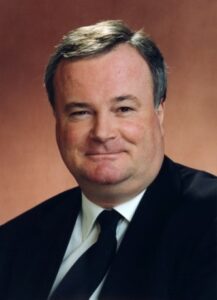
Boris Bergant
born 19.4. 1948, Maribor, Slovenia
Media Adviser
Experience in broadcasting: Editor of foreign affairs, Editor in chief news and current affairs, Deputy Director at TV Slovenia, radio programming, Deputy Director General RTV SLO 1989-2006
1990-1992 President of Circom Regional, European Association of Regional Television
1990-1992, and from 1996-2006 member of the Administrative Council of European Broadcasting Union (EBU)
1993-1998 Vice Chairman of the TV Committee of the EBU, on its behalf also member of the EBU Radio Committee
1995-2001 Secretary- General, Circom Regional
1998-2008 Vice President of the European Broadcasting Union (EBU/UER)
2009- Senior Consultant, EBU
working as consultant for broadcasting management, content, organisation
( developed Strategies of Public Service Media in Slovenia, Moldova, Georgia,
Serbia, Croatia, Montenegro, Ukraine ),
consulting media in Serbia, Slovakia, FYR Macedonia, Armenia, Kyrgistan, Bosnia
and Hercegovina, Kosovo, Lithuania, Cyprus, Portugal, Austria, Italy
2010 President, Board of SEEMO ( South and East Europe Media Organisation),Vienna
Representative of the Republic of Slovenia in different media committees of the Council of Europe ( 2004-2008 Chairman of the Standing Committee on Transfrontier Television).
Member of the International Academy of Television Arts & Sciences in New York.
Member of the World Committee ISAS for standardisation of broadcasting, Internet and press.
Experience in journalism: journalist by profession, President of the Slovenian Journalist Association (1987-1991).
Awarded with high recognitions for journalistic work:
Tomšičeva nagrada for the best journalistic achievement in Slovenia, rewards at the TV festivals Monte Carlo, New York, Leipzig
Busek Award for outstanding achievements
Publishing in the field of foreign politics and broadcasting
Foreign languages: English, German, Italian, Serbian/Croat
Address: BorBER,media activities, Ltd. Abramova ulica 8, 1000 Ljubljana, Slovenia , tel. +38641 641877, +3861 2561558, fax + 3861 2561559
E mail: boris.bergant@borber.si, bergantb@siol.net
Can you tell us a little more about your childhood and student period.
I was born in Maribor, a town with significant importance for the history of Slovenian statehood. I enjoyed elementary and middle school level education there, and then moved to Ljubljana to study. In Maribor I was already starting my journalism. It was a pleasant and very optimistic, but also active youth.
As a young student you spent a period in USA. It was the year 1968, and you lived in the socialist Yugoslavia. Was it easy for you to travel from Yugoslavia, as in many countries in East block it was very hard to leave the country.
Since the break with Stalin in 1948 Yugoslavia went its own geopolitical way, based on multiethnic and multi-religious, federal state composition. Based on bloody experiences from the past, Yugoslavs decided not to belong to any political/military alliance. Tito was also co-founder of the political movement of non-aligned, bloc-free countries – , playing a relatively significant role during the east-west confrontation, trying to ease the cold war paradigm and assist a historic process of de-colonisation. This became later a part of my journalistic activity.
We always regarded Yugoslavia as an international factor, much observed as an example of a country developing democratic ( and not bolshevik) socialism, as a unique federation of formally sovereign nations and nationalities as a country in the middle certainly not inside the “iron curtain”. We knew and we know that this was not an easy way, nor without problems. Contrary – a paradigm with errors and many fatal mistakes. But as we have been in this special international situation and by definition of our regime – every Yugoslav citizen did have right to his passport and could freely travel around the world. There has been ( until later changes of their position ) only three countries where we could not go/enter – South Africa ( because of apartheid), South Korea ( as a follow up of the war) and Taiwan ( following the one-China approach ). But this changed too.
Indeed my studying stayobert in the “revolutionary “ year 1968 in the USA has in many aspects influenced my scope, orientation and approach. It was the year of the assassination of Martin Luther King Jr., and Robert Kennedy, the anti Vietnam and ethnic uprising, burning Washington DC etc. I stayed in Kenyon College, Ohio (respected political sciences college, where Olof Palme and Paul Newman studied earlier ) . They are members of the Great Lakes College Association with whom the University of Ljubljana had and I believe still has a program of student’s exchanges. It is significantly to mention that very many our ( at least Slovenian ) scholars in the field of sociology have been studied or advanced studied in the USA. It shows our social context.
Can you tell us a little more about your family. Your son is a long year diplomat, you have several journalists in your family.
Well, we are a predominantly artistic- journalistic- juristic family. My grandmother settled in Maribor ( from Ljubljana ) after World War 1 to found the Slovenian national theatre in a mostly German-speaking elite town. My father was an active sportist and sports correspondent, my already passed elder brother was all his life journalist and editor, as also his son- my nephew. My son is a diplomat (currently Slovenian ambassador in Serbia) , the families women are medical doctor (mine) and in high juridical functions ( son’s and nephew’s). My both already adult grandchildren are students in the fields of law and arts.
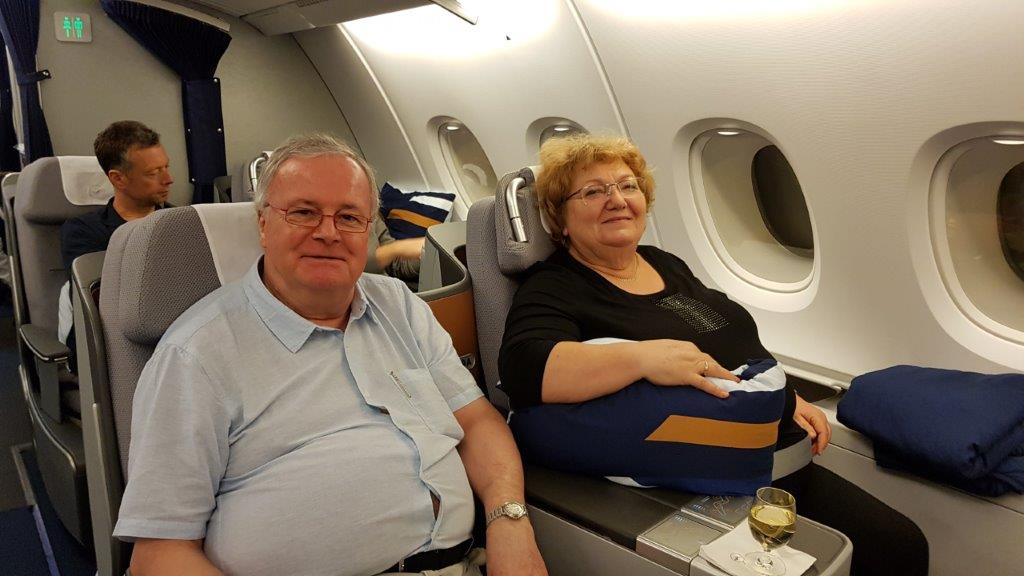
Boris Bergant and spouse Verena
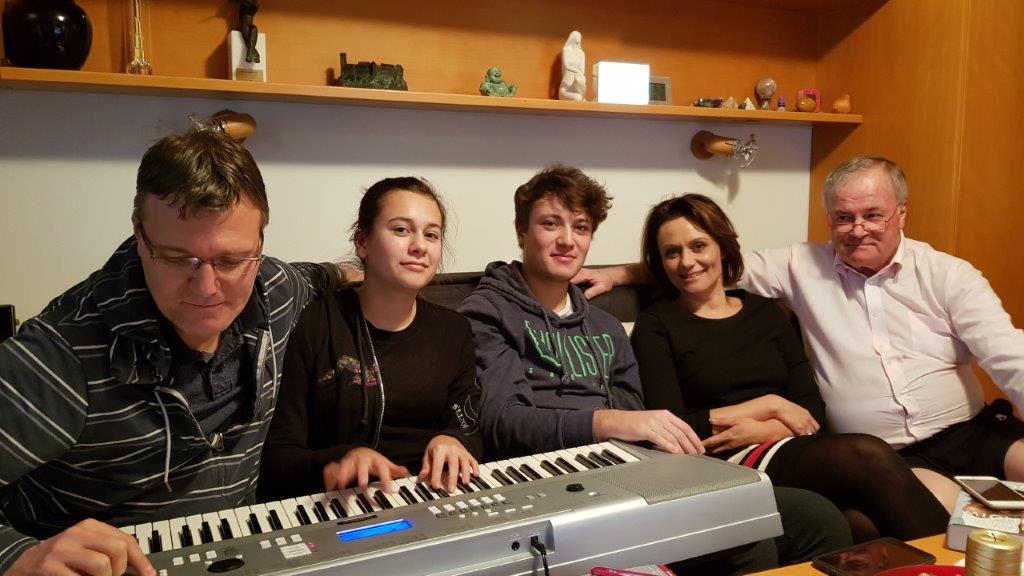
Boris Bergant with son Damjan’s family
How and when did you start your journalistic career?
I was always interested only in journalism, But my interest fields were foreign politics and international relations.
My father suddenly died in my age of 14.He had a regular sports program in the regional Radio Maribor ( a branch of our public service broadcasting house ).The editor at this station offered me to continue this program regardless of my age, appreciate and sponsor my talent. So I can say I have been journalistic and non-stop active in journalism since that age. While studying in Ljubljana, I was continuously working in Radio as a sports reporter and later in TV sports. I belong to the first news and Info generation of TV in Slovenian language, since forming the regular news program in 1968.
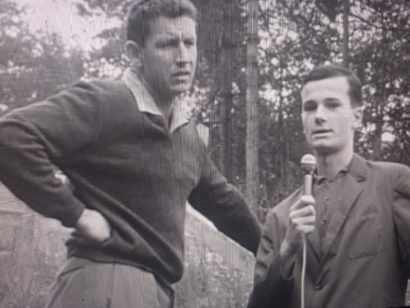
Boris Bergant as sports reporter 1967
Can you present us a little more your work in RTV Slovenia, where you worked from 1969 till 2009.
I experienced a usual professional career from a journalist and reporter in the daily TV news to an editor of the foreign policy department, chief editor of news, and later as deputy TV director . Later – for 17 “transitional years “ I was deputy Director General of RTV SLO. Those were times of many political changes on the top and either the incoming DG or the staff wanted guarantee for some sort of professionalism. It was an exciting and demanding part of my professional life – but also the most effective indeed.
In the years before the managerial duties, I was also active in the Slovenian Association of Journalists, in the period until 1991 it’s President ( for four years, amid transition into pluralistic democracy ). In that period, we finally managed to enter into the International Federation of Journalists – which was due to the foreign policy of the former Yugoslav Federation not being possible. Our association played together with IFJ a vital role to assist the journalists in former Yugoslavia being in war. This was also the time of establishing fruitful relations with IPI and the later activities within SEEMO.
You were involved in the start of the Alpe – Adria TV project. Can you present us this project.
Yugoslavia before 1990 has been per definition, very active in international relations. In this framework also Slovenia was attentive to maintaining and developing international links. During the time Slovenia became, due to economic achievements and development, even more attentive for extending ties with Western Europe and particularly within the co-called mid-European cultural area, using the earlier historical ties as a window for new definitions and common fields.
The idea of forming a radio and TV project Alps – Adria ( later Alps-Danube-Adria) was a common project olf ORF and RTV Ljubljana ( now RTV Slovenia). It started in 1981, to reaffirm our common values, elaborate history, achievements and promote talents and knowledge of each other. Since we had open borders, it should also foster travel and exchange. But we also wanted to include countries in the eastern vicinity.
By much persuasion, we managed finally to include Hungary.
This project is Europe’s oldest transborder regular exchange of program (a truly co-production ) still in existence. Editors have changed, but the project, now only in TV and online, remained. Partners are regional and national PSM from Slovenia, Croatia, Hungary, Italy, Bavaria and Austria. There have been ups and downs, with temporary absence, but the idea is still pursued, regularly, fortnightly .A brilliant example of professionalism and devotion.. My great honour and satisfaction.
We initiated much such cooperation of transborder nature in order to open the minds and borders. One of my favourite is the coproduction of 18 TV stations in the 80-ties “Minorities – the wealth of Europe” including Slovenia, Croatia, Vojvodina, Hungary, Sweden, Switzerland, Finland, East Germany (GDR) Austria, Denmark, Wales, Catalonia. This was one of the first documentary-art presentations of the problem of minorities in Europe. To signal that they must and should not be an obstacle, instead rather a bridge among nations and within the states.
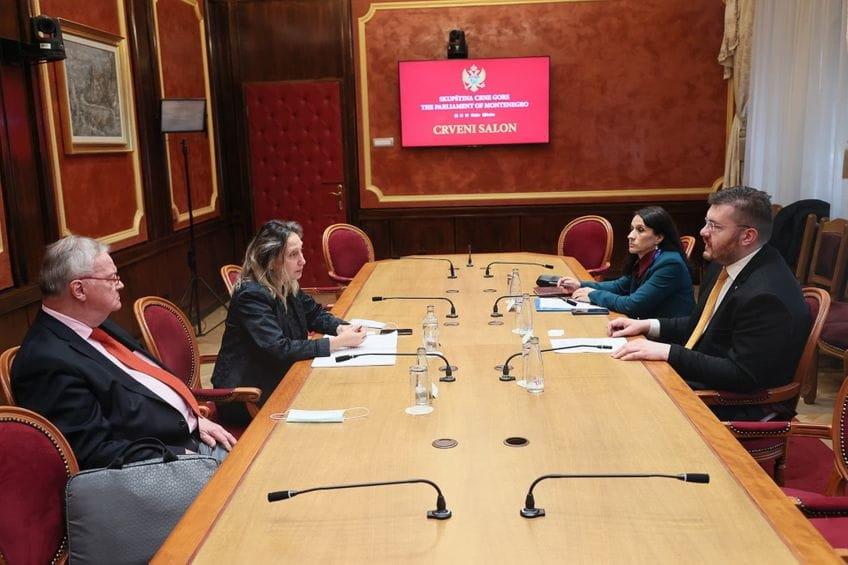
Boris Bergant with Radka Betcheva ( EBU ) in Parliament of Montenegro,
November 2021
How you started the cooperation with EBU?
In Yugoslavia, each of six republics had established a PSM in its own language ( additionally later also Kosovo and Vojvodina). All these stations have been linked in a common organ for international activities and exchange of programs and cooperations. It was similar to the German association of ARD or Swiss SSR- SRG.
The only political exception of Yugoslav neutrality was the founding member of EBU ( contrary to the Eastern OIRT ). We have been the only “ socialist “ member of the EBU since begin. As such, we have been actively participating in the organs of EBU. Some of these stations have been more active, some less – depending on experts and available people. But each of them could participate. either in the function of JRT representative ( elections, in turn, ) or directly, as experts.
It was a distinguishe and welcome opportunity for all of us to follow and actively participate in the fast-changing world of electronic media. In my career, I did experience all the significant phases of innovation – from black/white into colour TV, from analogue to digital and IT – all including total change of professional and organisational paradigm.
I started as JRT delegate in the News Group ( taking care of exchange of news, the policy of exchanges and priorities, co-productions of important events etc.). My first EBU meeting was in Corfu 1974, and I am still involved.
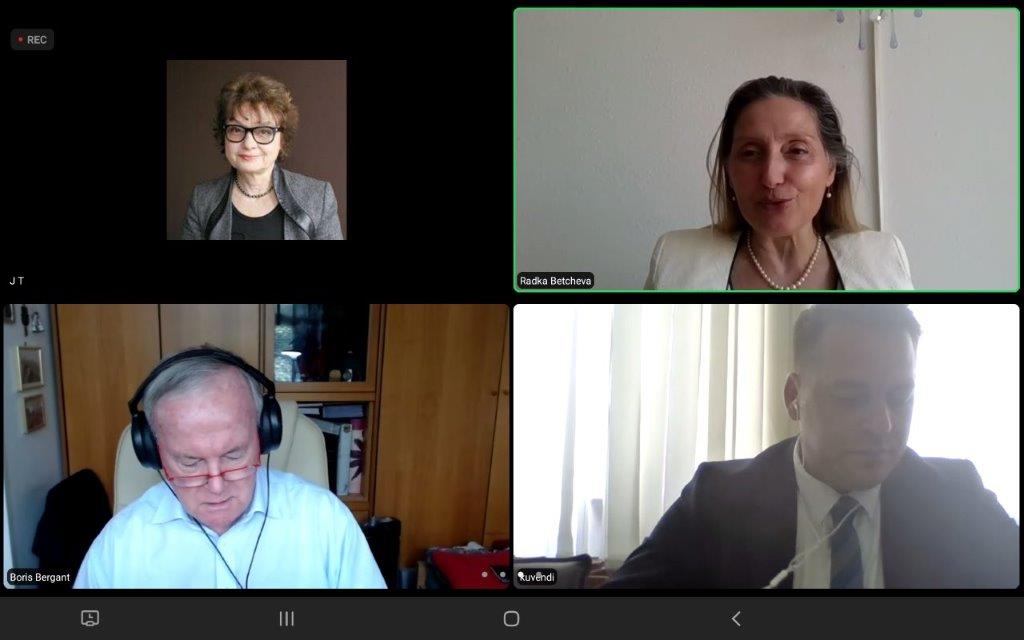
Video conferencing during Covid 19 pandemics
Your EBU – time. Please tell us a little more about this period of your working career.
The best would be the Latin tempora mutantur and nos mutamur in iis.
The media, and in particular public media, is a case of permanent changes, improvements, controversies and struggles. After participating in different organs and committees, I was at the end of 80-ties for four years serving as Vice President of the TV committee and then for ten years as the Vice President of the Union – the most extended VP term so far. It was the delicate period of unification of the PSM community in one organisation ( OIRT members joined ), accompanied by many problems and complications. It was the start of the transition from the state into public services in many of those countries ( unfortunately not yet finished ). It was a period to face the new challenges of the dual system ( public, non-commercial vs commercial ), the period of globalisation and the establishment of dangerous monopolies, not to mention the ex-YU wars ( including the bombardment of broadcasters ). EBU is still a symbol of the professionalism and solidarity of members. Still, we should more and more orient ourselves into the field of ethics and values with a critical orientation toward those who are offending and violating them and for a battle against fake news and hate speech.
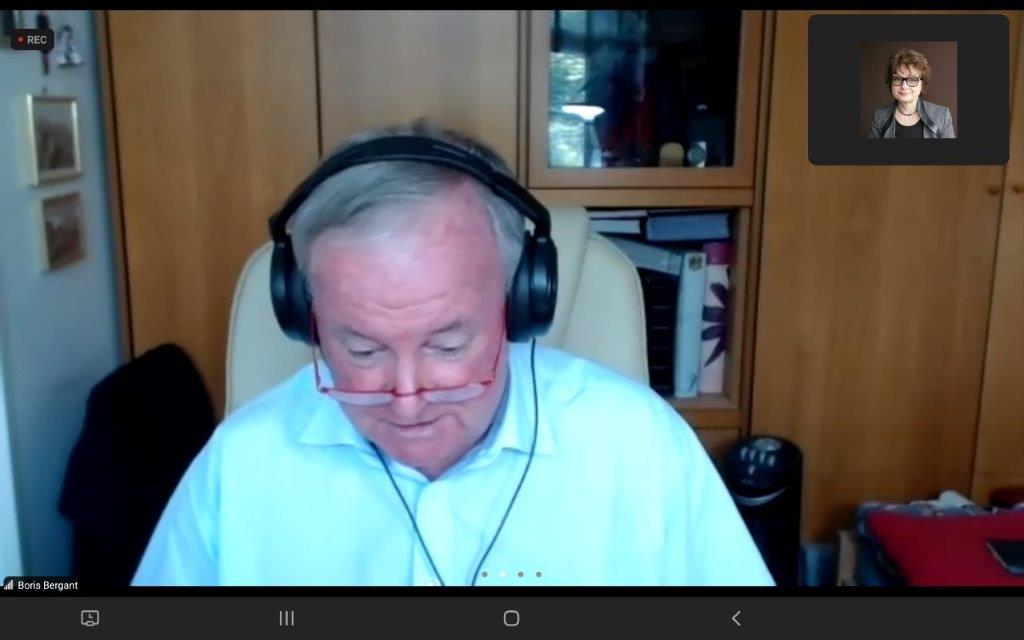
Boris Bergant
What are the main problems of public broadcaster in the year 2021?
While commercial providers depend on the will and interest of their owners, PSM are increasingly under the cross fire of interests of political parties and competitors, including their economic interest. The transition into public services is far from concluded. Next to political and economic dependence, the PSM’s faces unsustainable funding. The state budget financing has shown too much vulnerability. Therefore we have to find and develop better forms of funding. We can see it only within an open dialogue with our consumers – the public and together fight for independence. But the prerequisite for existence and future remains quality, reliability and relevance of our outputs.
Finally how you see the media situation in your country and in the SEEMO region.
Frankly, I am pretty embarrassed and anxious about current developments, mostly caused by politics and the lack of creative dialogue. I only hope that it is a temporary phenomenon, partly influenced by the various dilemmas around the Covid pandemics. But in any way, it is a retrograde development – a lack of trust in everything. It is a suboptimal state of affairs. Quarrel can be a motivating element of democracy, but it has to lead to a positive, better solution. I do not see much positive in these confrontations for the time being. When subjects in public discourse regard the opponents as enemies, there always exists a potential for delicate crises. I hope we shall overcome.
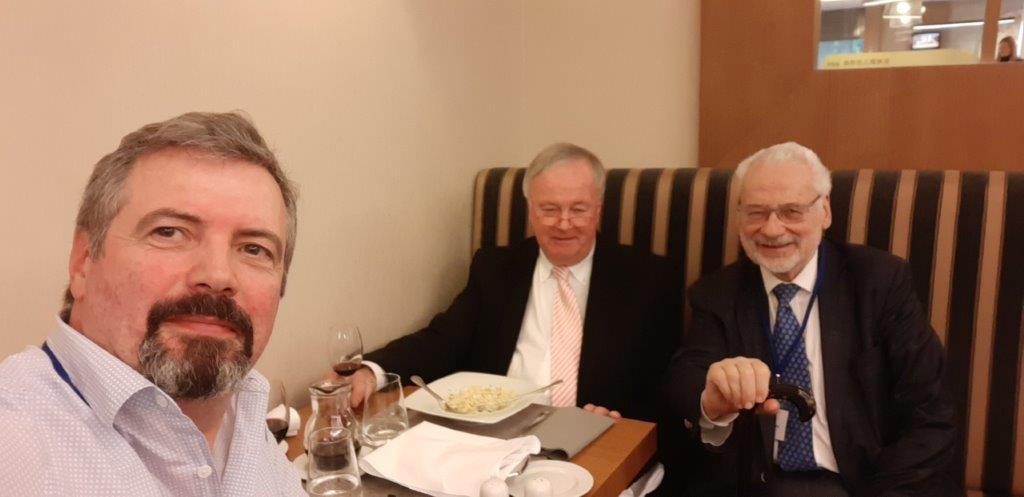
Boris Bergant with Dr. Erhard Busek and Agron Bajrami, distinguished
Kosovo journalist and new (2021) Kosovo ambassador
